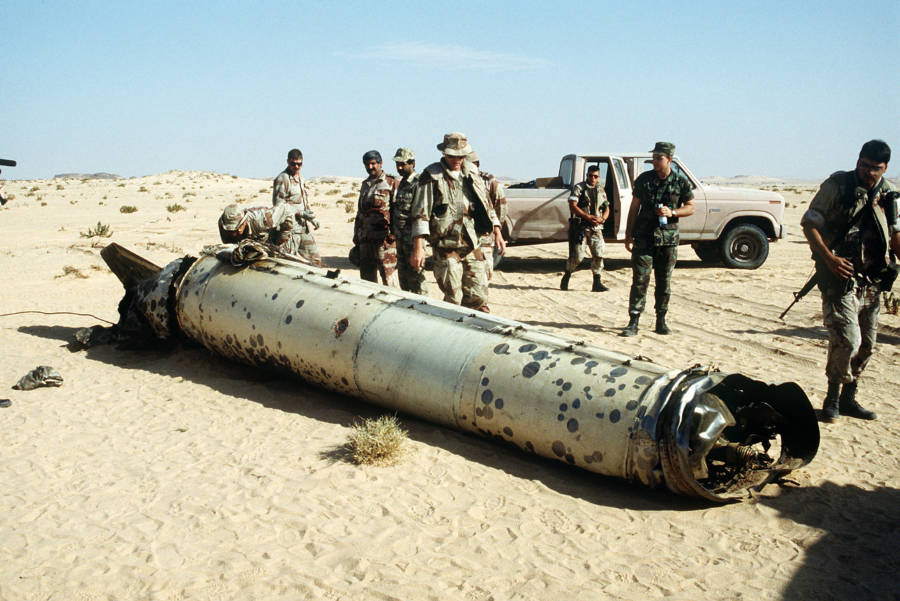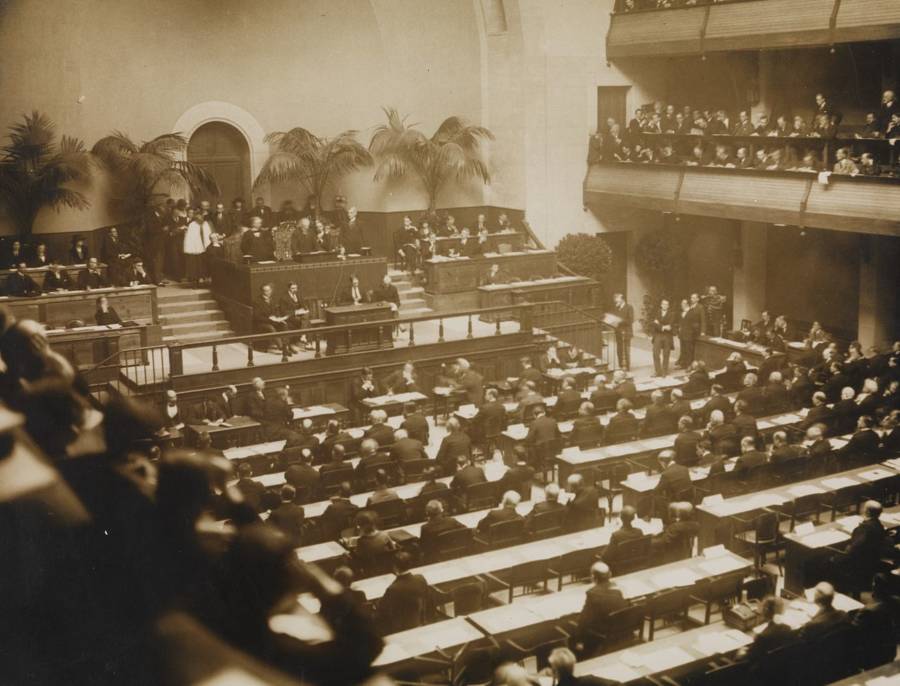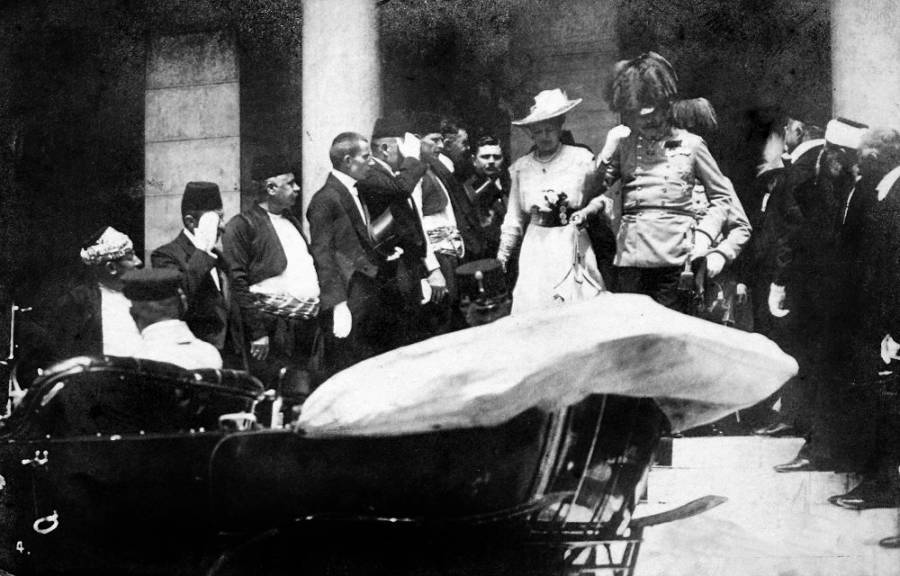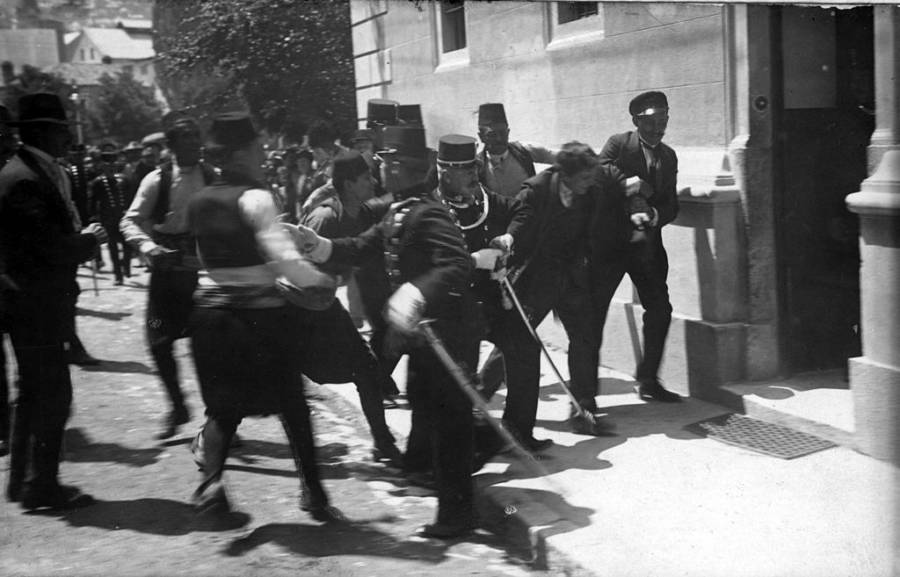From Columbus's voyage to the spark that ignited World War I, these tiny lapses in judgment led to some of history's greatest disasters.
While minor lapses in judgment in our daily lives — whether forgetting our wallet at home or locking our keys inside our car — are certainly annoying, the stakes are often relatively low. On rare occasions throughout history, however, one small misstep has ended in a derailed mission, massive destruction, or even death.
These are six small lapses in judgment that caused enormous historical catastrophes:
The Bay Of Pigs Invasion Was Foiled By Time Zones

MIGUEL VINAS/AFP/Getty ImagesCuban counter-revolutionaries, members of Assault Brigade 2506, after their capture during the Bay of Pigs invasion of Cuba. April 1961.
In April 1961, the CIA joined forces with counter-revolutionary Cuban exiles to undertake a military invasion of Cuba meant to overthrow Fidel Castro’s communist regime. When it failed horribly, it cemented its ignominious place in American history and left a large stain on the presidency of John F. Kennedy, who had approved the operation.
And the reason that the mission failed so horribly all stemmed from one small error made by its architects.
Kennedy had authorized a squadron of U.S. aircraft to assist with the invasion by escorting the mission’s B-26 bombers. However, the B-26s arrived near Cuba an hour before their escorts showed up. Unprotected, the B-26s were easily shot down by the Cubans and without aerial assistance, the invaders failed, with more than 100 of them killed (and ten times that captured).
The reason why the escorts had shown up late? The CIA and the Pentagon didn’t realize that there was a time zone difference between Nicaragua, where the escorts had left from, and Cuba.
Christopher Columbus Made One Major Miscalculation

Wikimedia CommonsChristopher Columbus landing in the West Indies, as depicted by artist John Vanderlyn.
Although Christopher Columbus remains celebrated (as well as controversial) centuries after his death as the first European to land in the Americas, this landing was not his original goal. His original intention was to discover a shorter trade route between Europe and Asia, the profitability of which secured Columbus’ funding from the Spanish crown, as many likely know.
What many may not know, however, is why Columbus’ original mission failed.
Columbus and his team had made one erroneous calculation, causing him to conclude that Asia was much closer to Europe than it truly is. Columbus mistakenly believed that one degree of longitude equaled 57 miles, while it is actually 69. When multiplied by the 360 degrees in a circle, the error was compounded into an enormous miscalculation.
Thus, Columbus set sail westward for Asia, believing it to be not far off the coast of Northern Africa. Instead, Asia was much farther away than he realized and he only made it as far as the Americas.
The Deadly Missile Attack That Came Down To Missing Tenths Of Seconds

Wikimedia CommonsPatriot missiles being launched to intercept an Iraqi Scud missile over Tel Aviv. February 12, 1991.
During the Gulf War, the U.S. and its allies operated a network of Patriot Missile Defense system batteries that intercepted incoming missiles fired by the enemy with missiles of their own. Computer software controlled the interception of these attacking missiles, but on February 25, 1991, the system failed. An Iraqi Scud missile hit an American barracks, killing 28 soldiers and injuring 100 others.

Wikimedia CommonsMilitary personnel examine a Scud missile downed by Patriot missiles. May 26, 1992.
The error arose from the system being used incorrectly. Its original programmers had never intended for the software to run continuously for periods in excess of 14 hours. But at the time of failure, it had been running for more than 100 hours.
One reason that this overlong period of continuous operation was dangerous is that the system’s internal clock wasn’t able to track tenths of seconds and thus, over long periods of time, the clock would become significantly inaccurate — a major problem in a system that must intercept missiles with pinpoint precision.
Allowing the system to run for too much time in the first place came courtesy of a small lapse in judgment from the troops on the ground. Fearing a missile attack, they decided not to reboot the system as they were nervous to have it down during the reboot period. This “precaution” ended up costing lives.
The Stray Dog That Started A War

Wikimedia CommonsThe League of Nations. 1920.
Dogs have a habit of creating rifts between neighbors. Late-night barking and defecating on a neighbor’s lawn are the usual disturbances. But when the neighbors are rivaling nations, the rifts can be far more severe.
Greece and Bulgaria had strained relations in 1925. Both countries laid claim to Macedonia and had clashed over the territory. With tensions already high, on October 18, 1925, a Greek soldier stationed on the border failed to keep a watchful eye on his dog and it ran into Bulgarian territory. Being a loyal owner, the soldier ran after his dog, only to be promptly shot and killed by Bulgarian sentries.
Greece was greatly angered by this killing and invaded Bulgaria, seizing the town of Petrich, ultimately leaving more than 100 dead, by some estimates. Thus one soldier not keeping his dog on a leash spurred a military conflict that the League of Nations had to step in and settle.
The Assassination Of Archduke Franz Ferdinand Was A Farce

Wikimedia CommonsFranz Ferdinand and his wife Sophie leave the Sarajevo Guildhall on the day of the assassination.
While deep-seated forces like unbridled nationalism may have been the stronger factors that caused World War I, the spark that ignited the unimaginably violent and destructive conflict was the assassination of Austrian Archduke Franz Ferdinand.
On June 28, 1914, six Serbian assassins set out to kill Ferdinand in Sarajevo. While they did accomplish their goal, the way in which they did it was fraught with small errors that changed the course of history.
The assassins stationed themselves in different locations along Ferdinand’s parade route. The first two assassins failed to act. The third threw his bomb at Ferdinand’s car, but it bounced off and failed to harm him. The next two assassins were too scared by this mishap to act. The sixth assassin re-positioned himself and hoped for another opportunity.
As luck would have it for this assassin, Gavrilo Princip, Ferdinand’s driver took a wrong turn, unexpectedly bringing the car onto the street where the assassin now found himself. The driver, intending to reverse and correct his mistake, stopped the car directly in front of the assassin, who fired into the car, killing Ferdinand and his wife.

Wikimedia CommonsAssassin Gavrilo Princip is arrested just after the shooting.
The Mars Climate Orbiter: Brought Down By Unit Conversions

Wikimedia CommonsDiagram of the mishap during the Mars Climate Orbiter mission that resulted in the loss of the spacecraft.
Traveling to a foreign country that uses a different unit system for measurements can be a minor annoyance for tourists trying to convert speed limits, temperatures, and volumes on the fly. But a mistake of this kind usually results in no more than light frustration.
However, when traveling to space, as in the case of the U.S. Mars Climate Orbiter, mistaken units can derail a multi-million dollar mission.
On December 11, 1998, the Mars Climate Orbiter had been in flight for nearly a year when it lost communication with NASA. The orbiter entered the orbit of Mars at an angle too steep, causing it disintegrate in Mars’ atmosphere.
The reason that several hundred million dollars worth of research, planning, and machinery had burnt up into dust was one little discrepancy in a unit of measurement. The software being used was measuring thruster outputs in pound-seconds, while it should have been using Newton-seconds. If the engineers had checked their units, the orbiter mission would have likely succeeded.
Next, read up on 17 historical coincidences that will blow your mind. Then, take a look at the deadliest disasaters in modern history.





